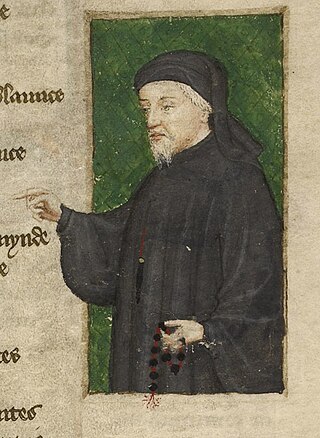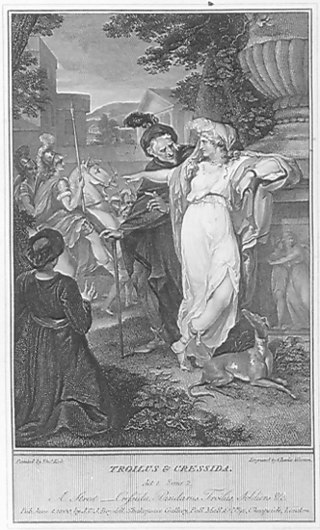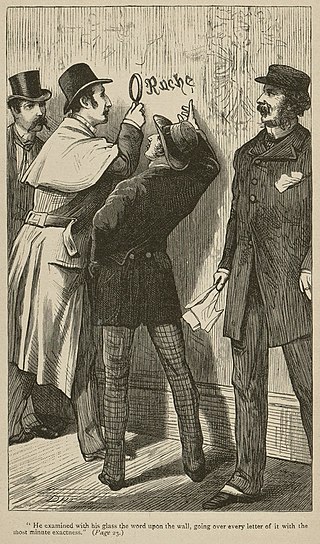Related Research Articles

Geoffrey Chaucer was an English poet, author, and civil servant best known for The Canterbury Tales. He has been called the "father of English literature", or, alternatively, the "father of English poetry". He was the first writer to be buried in what has since come to be called Poets' Corner, in Westminster Abbey. Chaucer also gained fame as a philosopher and astronomer, composing the scientific A Treatise on the Astrolabe for his 10-year-old son, Lewis. He maintained a career in the civil service as a bureaucrat, courtier, diplomat, and member of parliament.
A morpheme is the smallest meaningful constituent of a linguistic expression. The field of linguistic study dedicated to morphemes is called morphology.

A proverb or an adage is a simple, traditional saying that expresses a perceived truth based on common sense or experience. Proverbs are often metaphorical and are an example of formulaic language. A proverbial phrase or a proverbial expression is a type of a conventional saying similar to proverbs and transmitted by oral tradition. The difference is that a proverb is a fixed expression, while a proverbial phrase permits alterations to fit the grammar of the context. Collectively, they form a genre of folklore.

Pandarus or Pandar is a Trojan aristocrat who appears in stories about the Trojan War.
The dog days or dog days of summer are the hot, sultry days of summer. They were historically the period following the heliacal rising of the star system Sirius, which Hellenistic astrology connected with heat, drought, sudden thunderstorms, lethargy, fever, mad dogs, and bad luck. They are now taken to be the hottest, most uncomfortable part of summer in the Northern Hemisphere.

Azure is the color between cyan and blue on the spectrum of visible light. It is often described as the color of the sky on a clear day.
The squeaky wheel gets the grease is an American aphorism or metaphor attesting that matters which draw themselves to our attention are more likely to be addressed than those which do not. The term makes no necessary correlation between the volume of a complaint and its stridency with its merit.
The story and metaphor of The Dog in the Manger derives from an old Greek fable which has been transmitted in several different versions. Interpreted variously over the centuries, the metaphor is now used to speak of one who spitefully prevents others from having something for which one has no use. Although the story was ascribed to Aesop's Fables in the 15th century, there is no ancient source that does so.

Wellerisms, named after sayings of Sam Weller in Charles Dickens's novel The Pickwick Papers, make fun of established clichés and proverbs by showing that they are wrong in certain situations, often when taken literally. In this sense, Wellerisms that include proverbs are a type of anti-proverb. Typically a Wellerism consists of three parts: a proverb or saying, a speaker, and an often humorously literal explanation.

An anti-proverb or a perverb is the transformation of a standard proverb for humorous effect. Paremiologist Wolfgang Mieder defines them as "parodied, twisted, or fractured proverbs that reveal humorous or satirical speech play with traditional proverbial wisdom". Anti-proverbs are ancient, Aristophanes having used one in his play Peace, substituting κώẟων "bell" for κύων "bitch, female dog", twisting the standard and familiar "The hasty bitch gives birth to blind" to "The hasty bellfinch gives birth to blind".

A red herring is something that misleads or distracts from a relevant or important question. It may be either a logical fallacy or a literary device that leads readers or audiences toward a false conclusion. A red herring may be used intentionally, as in mystery fiction or as part of rhetorical strategies, or may be used in argumentation inadvertently.

Netherlandish Proverbs is a 1559 oil-on-oak-panel painting by Pieter Bruegel the Elder that depicts a scene in which humans and, to a lesser extent, animals and objects, offer literal illustrations of Dutch-language proverbs and idioms.
A sticky wicket is a metaphor used to describe a difficult circumstance. It originated as a term for difficult circumstances in the sport of cricket, caused by a damp and soft wicket.

Paremiography is the study of the collection and writing of proverbs. A recent introduction to the field has been written by Tamás Kispál. It is a sub-field of paremiology, the study of proverbs.

Wolfgang Mieder is a retired professor of German and folklore who taught for 50 years at the University of Vermont, in Burlington, Vermont, USA. He is a graduate of Olivet College (BA), the University of Michigan (MA), and Michigan State University (PhD). He has been a guest speaker at the University of Freiburg in Germany, the country where he was born.

It takes two to tango is a common idiomatic expression which suggests something in which more than one person or other entity are paired in an inextricably-related and active manner, occasionally with negative connotations.

Ibibio is the native language of the Ibibio people of Nigeria, belonging to the Ibibio-Efik dialect cluster of the Cross River languages. The name Ibibio is sometimes used for the entire dialect cluster. In pre-colonial times, it was written with Nsibidi ideograms, similar to Igbo, Efik, Anaang, and Ejagham. Ibibio has also had influences on Afro-American diasporic languages such as AAVE words like buckra which come from the Ibibio word mbakara and in the Afro-Cuban tradition of abakua.
The phrase out of the frying pan into the fire is used to describe the situation of moving or getting from a bad or difficult situation to a worse one, often as the result of trying to escape from the bad or difficult one. It was the subject of a 15th-century fable that eventually entered the Aesopic canon.

The expression cart before the horse is an idiom or proverb used to suggest something is done contrary to the natural or normally effective sequence of events. A cart is a vehicle that is ordinarily pulled by a horse, so to put the cart before the horse is an analogy for doing things in the wrong order. The figure of speech means doing things the wrong way round or with the wrong emphasis or confusing cause and effect.
References
- ↑ Jarvie 2009, p. 218, let sleeping dogs lie.
- 1 2 3 Mamatas 2013, p. 107.
- ↑ Ayto 2020.
- ↑ Manser, Fergusson & Pickering 2007, p. 165.
- 1 2 Speake 2015, p. 288.
- ↑ Leininger 1960, pp. 52–53.
- ↑ Bryan & Mieder 2005, p. 220.
- ↑ Norrick 1985, p. 23.
- ↑ West 2012.
- ↑ Grimm 1854.
- ↑ Ruef 1995, p. 188.
- ↑ Duden 2020, p. 662.
- ↑ Mayer 2015, p. 19.
- ↑ Mosti 2014, p. 6.
- ↑ Голицына 2023, p. 23.
- ↑ Al Kayed, Alkayid & Essa 2023.